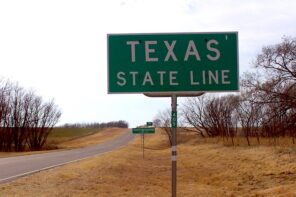Nine sitting law professors at major universities in Texas have drafted an open letter to lawmakers in their state who just approved a controversial “religious freedom” bill that would allow state-funded adoption agencies to discriminate against prospective parents who are LGBT, single or not Christian. RD obtained an exclusive copy of the legal memo signed by scholars currently teaching at some of Texas’ most prestigious institutions, including the University of Texas, Texas A&M, the University of Houston and Southern Methodist University. While it’s not unheard of for law professors to weigh in on pending state legislation, it’s uncommon for legal scholars to voluntarily step into such a controversial topic in state politics.
In the nine-page memo (posted in full below), the professors meticulously lay out the reasons why House Bill 3859 , formally titled the “Freedom to Serve Children Act” is not only unnecessary, but also likely unconstitutional—raising serious Establishment Clause concerns. Although the bill doesn’t identify specific religious beliefs that must be protected, the fact that all faith-based child welfare agencies in Texas are Christian makes plain the kinds of people who will most likely be turned away.
“The larger context in which H.B. 3859 has been proposed suggests that it is intended specifically to protect and advance particular religious beliefs about sexual orientation, gender identity, and reproduction,” write the professors. “While the bill specifically does not permit agencies to discriminate on the bases of race, ethnicity, or national origin, no such exception is made for discrimination on the basis of sex, sexual orientation, gender identity, or disability. The Establishment Clause has been construed to prevent the government from favoring or disfavoring any particular religion or religion in general. To the extent that H.B. 3859 can be understood specifically to protect and promote certain conservative beliefs about sex and sexuality, it raises serious Establishment Clause questions.”
The legislation passed the Texas Senate on a primarily partisan vote early Monday morning, and is currently awaiting the governor’s signature. If Republican Gov. Greg Abbott signs the bill as anticipated, Texas will join South Dakota and Alabama in granting uniquely broad permission for faith-based child welfare agencies to refuse to place children with well-qualified families, for the sole reason that those families don’t subscribe to the agency’s particular interpretation of religious doctrine. What’s more, an underreported clause in the bill codifies into law any agency’s absolute right to compel minors in their care to undergo a “religious education”—which advocates worry could mean forced “conversion therapy” for LGBT youth, who make up a disproportionate share of children in foster care nationwide.
But that’s just the tip of the iceberg when it comes to the harm this legislation could do, the professors write. Here’s a sampling of the additional legal issues such a sweeping law would create, according to the legal memo:
H.B. 3859 prioritizes the “sincerely held religious beliefs” of agencies over the welfare of children.
- H.B. 3859 tips the scales in favor of only one interest—the religious liberty and beliefs of child services agencies—foreclosing the opportunity for competing interests to be carefully weighed and properly considered.
- The absolute protection H.B. 3859 would provide to these agencies is overly broad and would make thousands of Texas’ most vulnerable homeless and runaway youth even more vulnerable.
- This unyielding preference for certain religious liberty rights overlooks numerous important government interests—including the need to prevent discrimination, ensure children’s welfare and protect the religious rights of children in foster care—and threatens to violate the Establishment Clause.
The bill runs afoul of existing protections ensuring children in foster care have their medical, mental health and psychological needs met according to the child’s best interest or expressed preference.
The Texas administrative code grants children in foster care a range of rights, including: the right to fair treatment, the right to receive educational services “appropriate to the child’s age and developmental level,” the right to have the child’s religious needs—which may be distinct from the religious beliefs of the agency—met, and the right of children to “not be pressured to get an abortion, give up her child for adoption or parent her child.” Texas also requires that children in foster care have the right to medical and mental health care “that adequately meet the child’s needs.”
The law could compel the state to contract with agencies that practice harmful, discredited “conversion therapy” or other unscientific “faith-based” treatments without considering the negative impact on children subjected to such treatment.
Texas would be unable to deny a child welfare social service provider a government contract even if the provider advocates that sexual orientation and gender identity may be changed through dangerous and medically-invalid “conversion therapy,” that children should abide by and be educated in accordance with biblical gender roles, that mental illness should be treated through prayer rather than conventional medical treatment, or that divorce is immoral, even in circumstances of domestic violence.
H.B. 3859 violates the Establishment Clause by allowing state funds to be used to compel minors into religious education, without providing ample opportunities for comparable secular instruction or support.
Where private individuals have no or insufficient choice in selecting a religious program, government support for a religious organization violates the Establishment Clause. Courts are particularly sensitive to Establishment Clause concerns when children are involved, as they are assumed to be especially susceptible to religious coercion.
- [H.B. 3859] therefore requires Texas to improperly contract with and fund organizations that include—or even mandate—religious programming. Even if youth are able to opt out of religious activities, or out of the program entirely, the placement of at-risk youth in programs that offer religious instruction nevertheless violates the Establishment Clause, as this placement would advance or endorse a particular religious viewpoint.
Read the entire memo below.
TX 3859 – Open Letter to Texas Legislators from Texas Law School Professors by Sunnivie Brydum on Scribd




